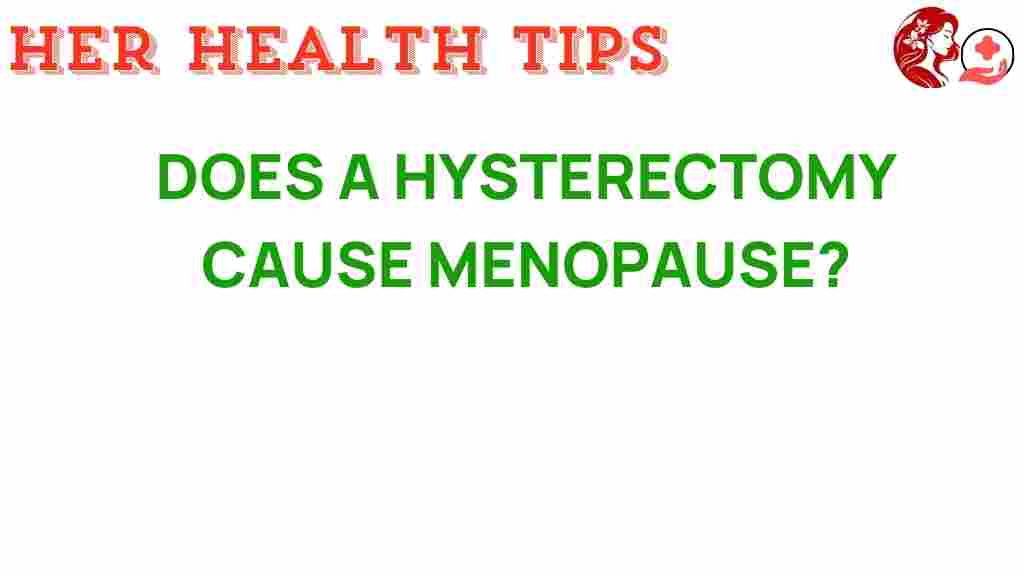Unraveling the Myth: Does a Hysterectomy Trigger Menopause?
When it comes to women’s health, the topic of hysterectomy and its relationship to menopause often generates a lot of confusion and misinformation. Many women fear that undergoing a hysterectomy will automatically plunge them into menopause, leading to a myriad of hormonal changes and health impacts. This article aims to clarify the myths surrounding hysterectomy and menopause, providing accurate information to help women make informed decisions about their reproductive health.
Understanding Hysterectomy
A hysterectomy is a surgical procedure that involves the removal of a woman’s uterus. Depending on the specific needs of the patient, the surgery can be partial (removing only the uterus) or total (removing the uterus and cervix). In some cases, the ovaries and fallopian tubes may also be removed, which can influence hormonal levels and lead to menopause.
Types of Hysterectomy
There are several types of hysterectomy procedures, including:
- Total Hysterectomy: Removal of the uterus and cervix.
- Partial (Subtotal) Hysterectomy: Removal of the upper part of the uterus, leaving the cervix intact.
- Radical Hysterectomy: Removal of the uterus, cervix, part of the vagina, and surrounding tissues, often performed in cancer cases.
- Hysterectomy with Oophorectomy: Removal of the uterus along with one or both ovaries, which can trigger menopause.
What Happens During a Hysterectomy?
The hysterectomy procedure can be performed in various ways, including abdominal, vaginal, or laparoscopic methods. The choice of technique often depends on the reason for the surgery and the patient’s overall health. Regardless of the method, the surgery is typically performed under general or regional anesthesia.
Does a Hysterectomy Trigger Menopause?
One of the most common myths is that any kind of hysterectomy will lead to immediate menopause. The truth is more nuanced and depends on several factors:
The Role of Ovaries in Menopause
Menopause is defined as the time in a woman’s life when menstrual periods permanently cease, typically occurring between ages 45 and 55. It is primarily driven by hormonal changes in the ovaries. If the ovaries are left intact during a hysterectomy, a woman will not enter menopause immediately, although she may experience other hormonal changes.
Hysterectomy with Oophorectomy
If the surgery involves the removal of the ovaries (oophorectomy), menopause will occur immediately after the procedure. This is sometimes referred to as surgical menopause. The abrupt loss of estrogen and progesterone can lead to symptoms such as:
- Hot flashes
- Night sweats
- Vaginal dryness
- Mood swings
Hysterectomy Without Oophorectomy
For women who have a hysterectomy without the removal of the ovaries, menopause will not occur right away. However, some studies suggest that the surgery may lead to earlier menopause in some women due to potential changes in blood flow to the ovaries or the psychological impact of the surgery. It’s important to remember that every woman’s experience is unique.
Factors Influencing Menopause Onset
Several factors can influence when a woman might enter menopause, including:
- Age at the time of surgery
- Family history of menopause
- Overall health and lifestyle
Health Impact of Hysterectomy
Understanding the health impacts of hysterectomy is essential for women considering this surgery. The decision to undergo a hysterectomy is often based on medical conditions such as:
- Fibroids
- Endometriosis
- Chronic pelvic pain
- Uterine prolapse
- Cancer treatments
While a hysterectomy can alleviate these conditions, it may also lead to complications or changes in health. Some potential health impacts include:
- Hormonal Changes: Removal of the ovaries results in a sudden drop in hormones.
- Bone Health: A decrease in estrogen can lead to bone density loss.
- Cardiovascular Health: Hormonal changes may increase the risk of heart disease.
- Sexual Health: Some women may experience changes in libido or discomfort during intercourse.
Recovery After Hysterectomy
The recovery process varies depending on the type of hysterectomy performed. Generally, women can expect the following:
- Hospital Stay: A stay of 1 to 3 days, depending on the surgery type.
- Rest: A period of rest is crucial for healing, usually recommended for 4 to 6 weeks.
- Follow-up Care: Regular check-ups to monitor recovery and address any concerns.
Debunking Common Myths About Hysterectomy and Menopause
Understanding the myths surrounding hysterectomy and menopause can help women make informed decisions. Here are some common misconceptions:
Myth 1: All Hysterectomies Cause Menopause
As discussed, not all hysterectomies result in menopause. The outcome depends significantly on whether the ovaries are removed.
Myth 2: Hysterectomy is the Only Option for Reproductive Issues
Many non-surgical treatments, such as medication or hormonal therapy, are available for managing conditions like fibroids or endometriosis.
Myth 3: Recovery From Hysterectomy is Quick and Easy
Recovery can be a lengthy process, and many women may need emotional and physical support during this time.
Myth 4: After a Hysterectomy, You Can’t Have a Healthy Sex Life
Many women can maintain a healthy sex life post-hysterectomy. Open communication with partners and healthcare providers is key.
Conclusion
In conclusion, while a hysterectomy can lead to significant changes in a woman’s reproductive system and hormonal balance, it does not automatically trigger menopause unless the ovaries are removed. Understanding the facts and debunking myths surrounding hysterectomy and menopause is crucial for women’s health. Always consult with a healthcare provider to explore all options and make informed choices regarding reproductive health. If you’re considering a hysterectomy, take the time to discuss your specific situation and the potential impacts on your health.
For more information on women’s health and reproductive issues, visit Women’s Health Resources. You can also read more about the effects of hormonal changes post-surgery at Healthline.
This article is in the category Reproductive and created by HerHealthTips Team
